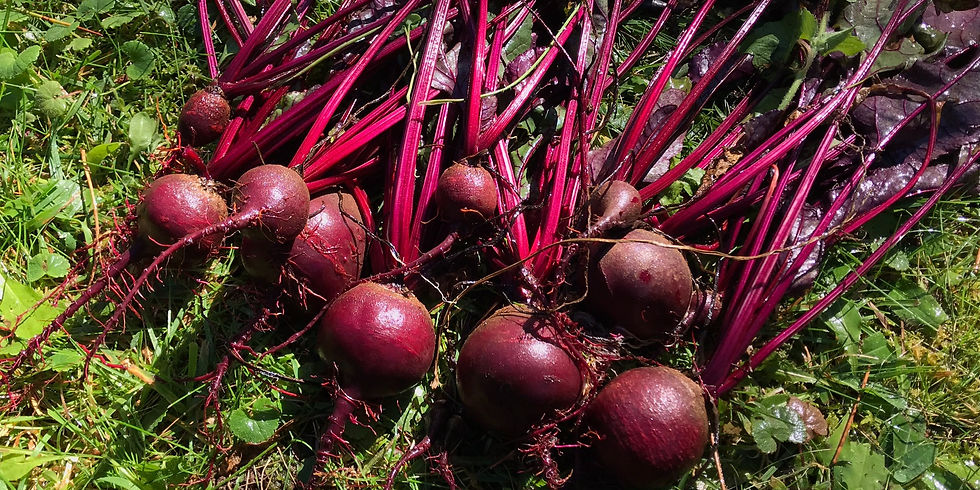Beets: Crimson Globes Rich in Nutrients
- Adventure 38

- Apr 30, 2023
- 3 min read

Oh, these crimson globes of the earth, how gloriously they shine in the sun, with their sweet, earthy fragrance and their vibrant hues that rival the most splendid of sunsets!
Beets are a root vegetable with a sweet taste and earthy undertones. Beets are nutrient dense with fibre, folate, vitamin C, iron, and potassium. Cook beets in a variety of ways, such as roasting, blending, or stir-frying. Beets are a popular ingredient used in cuisines worldwide.
Why couldn't the beet go on a date?
Because it already had a sweetie!
Tips for growing beets:
Soil preparation: Beets grow best in loose, well-drained soil that is rich in organic matter. Before planting, remove any rocks or debris and work in compost or well-rotted manure to improve the soil's fertility.
Adequate water: Water beets regularly, as they need consistent moisture to grow properly. But over watering can lead to rot and under watering might cause the beets to become tough and woody.
Proper spacing: Beets need room to grow; space them at least three inches apart in rows that are 12 to 18 inches apart. Thinning beets is important, as crowded beets will not grow to their full size. When thinning, leave the strongest plants in each row and remove the ones that are weaker.
Cooking with beets:
Roasted beets: Roasting beets will bring out their natural sweetness and enhance their flavor. Just wrap beets in foil and roast them in the oven at 400°F (205°C) until they are tender. Once they are cool enough to touch, remove the skin and chop them into bite-sized pieces. Use roasted beets in salads, as a side dish, or as a topping for pizza.
Beet hummus: To make beet hummus, blend cooked beets with chickpeas, tahini, lemon juice, garlic, and olive oil until smooth. The result is a vibrant, pink hummus that is great for dipping veggies or crackers.
Beet greens stir-fry: Don't throw away the greens attached to beets; eat them too! Saute the beet greens with garlic and onion in a splash of oil until they wilt. Add a touch of vinegar, salt, and pepper to taste, and present as a side dish. This is a nutritious way to use the whole beet plant.
Key nutritional benefits of beets:
Rich in nutrients: Beets are a wonderful source of important nutrients, including fiber, vitamin C, folate, potassium, and manganese. Plus, they contain smaller amounts of other essential vitamins and minerals, including iron, magnesium, and phosphorus.
Heart-healthy: Beets are rich in nitrates, which can help lower blood pressure, reduce inflammation, and improve overall heart health. In addition, the nitrates in beets can improve blood flow to the brain, which may help to prevent cognitive decline.
Antioxidant properties: Beets contain a variety of antioxidants, including anthocyanins and betalains, which can reduce inflammation and help to protect the body against oxidative stress. These antioxidants may additionally help to prevent chronic diseases such as diabetes and cancer and may have anti-aging effects.
Beets, so often overlooked,
In colour, they make quite a hook,
Rich in folate and fibre,
These roots, our health, they deliver.
In conclusion, beets are a highly nutritious root vegetable that can give you health benefits. Enjoy beets in a variety of ways, from roasting to blending to stir-frying; they are a versatile and tasty ingredient used in dishes worldwide. Overall, beets are a nutrient-dense food that can be an excellent choice for anyone looking to improve their diet and overall health.
The information provided on this website is for informational or educational purposes only. It is not a substitute for professional medical advice, diagnosis, or treatment. Please consult your physician for personalized medical advice.





Comments